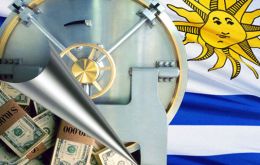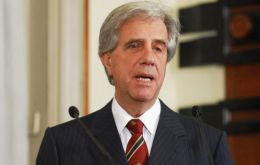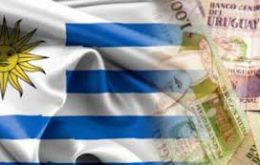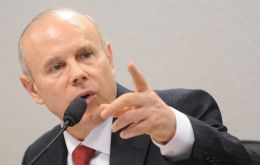MercoPress. South Atlantic News Agency
Tag: Uruguay economy
-
Friday, March 27th 2015 - 08:57 UTC
Uruguay's economy expanded 3.5% in 2014, completing over a decade of sustained growth

Uruguay's GDP expanded a strong 3.5% during 2014 over the previous year, with positive activity in most sectors of the Mercosur member economy, according to the latest report from the Central bank. The result was in line with government officials expectations of 3% growth last year.
-
Tuesday, March 3rd 2015 - 06:34 UTC
Uruguay's economy vulnerabilities: inflation and budget deficit, says IMF report

The Uruguayan economy is decelerating gradually after a decade of strong and inclusive growth. Export receipts are growing at a markedly lower clip than a few years ago and domestic demand growth is slowing towards a more sustainable pace. At the same time, inflation remains above the target range and the primary fiscal balance has weakened further in 2014.
-
Wednesday, December 3rd 2014 - 09:31 UTC
Analysts anticipate 'painful adjustment' for Uruguay if there is a continuity of current policies

High inflation, relatively weak economic growth and an exhausted growth model are forecasted for Uruguayan president-elect Tabare Vazquez second administration as of next March, according to the latest report from two Capital Economics analysts.
-
Saturday, November 29th 2014 - 07:11 UTC
IDB loan for Uruguay to promote quality investments and exports

The Inter-American Development Bank (IDB) has approved a 120 million dollars loan to finance the second phase of Uruguay's Strategic International Positioning Program. Its goal is to consolidate the country's international positioning, contributing to an increase in investments—mainly those aimed at high value-added sectors— and exports.
-
Monday, October 6th 2014 - 06:44 UTC
Uruguay forced to lower public utility rates to keep inflation below 10%

Uruguay's inflation indicator dropped to 8.36% in September from 8.75% in August, according to the latest report from the country's stats office INE. During September consumer prices increased a full 1%, and 8,04% in the first nine months of the year. However despite the high percentage it is below the same period a year ago: 8.41%.
-
Thursday, October 2nd 2014 - 07:06 UTC
Uruguay's fiscal deficit 'relatively' stable at 3.3% of GDP

Uruguay's fiscal deficit in the twelve months to August was equivalent to 3.3% of GDP, or 1.725bn dollars according to the latest release from the Economy and Finance ministry. However the primary deficit (before debt payments) was 202 million dollars or 0.39% of GDP.
-
Tuesday, September 16th 2014 - 05:25 UTC
Uruguay's economy expands 3.7% during the second quarter over a year ago

Confirming ten years of sustained expansion the Uruguayan economy advanced 2% in the second quarter over the first quarter and 3.7% over the same period a year ago, according to the latest reports from the Central bank.
-
Saturday, July 5th 2014 - 09:13 UTC
Uruguay's inflation index for June slightly down: 9.08% in twelve months

Uruguay's inflation index experienced a slight deceleration during the twelve months to June, from 9.18% in May to 9.08%, basically because of cheaper fresh food, frozen public utility rates including fuel, while a stabilized exchange rate for the US dollar with a strong Peso, helped with imported goods.
-
Thursday, June 26th 2014 - 04:53 UTC
Job creation in Brazil down, but unemployment still at record lows

Brazil's economy added a net 58,836 payroll jobs in May, the Labor Ministry said, which is the worst figure for May since 1992. Brazil added 105,000 jobs in April.
-
Wednesday, June 18th 2014 - 08:31 UTC
Uruguay economy growing at a slower pace: imports up; exports stagnant

Uruguay's economy expanded 2.4% in the first quarter compared with the same 2013 period, but contracted 0.4% compared with the fourth quarter of last year, the central bank said this week. However deceleration is a fact since growth of the first quarter in 2013 has gone up 4.6% over 2012.
